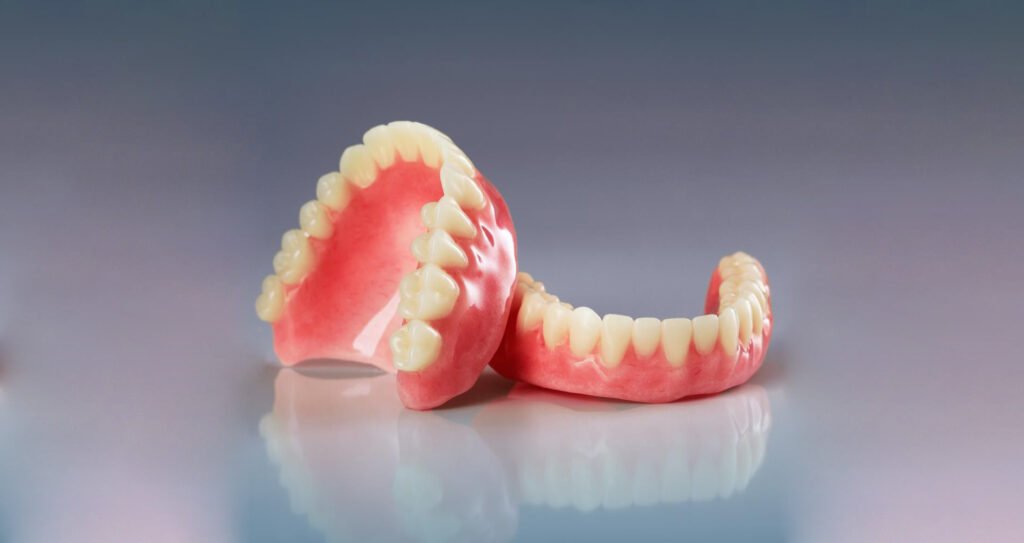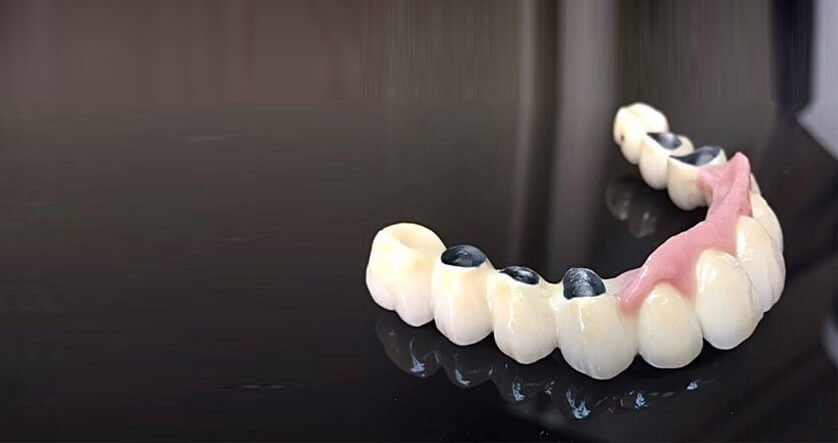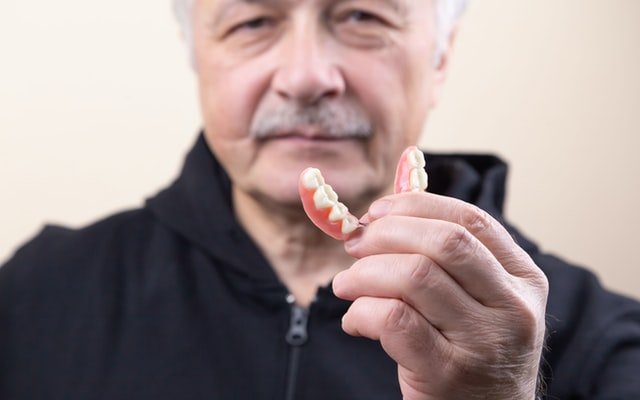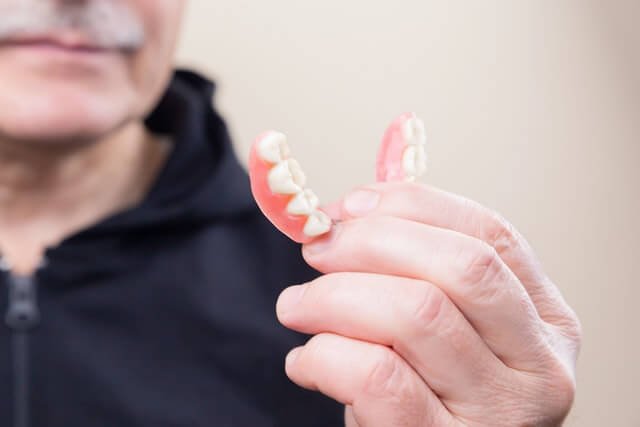Denture Fast Facts
- There are multiple types of dentures: partial, complete, implanted.
- Dentures were used as early as the 1700s!
- The first dentures used wooden teeth
Do you or someone you know have a set of dentures and you’re wondering how to take to the best care of them that you can? Well, we wrote, “The Ultimate Guide To Dentures” so you can get all your questions right from this article. We recommend bookmarking this article so you can come right back here any time you have a question!
What are dentures?
Dentures are dental prosthetics that will replace your teeth, they are a removable solution that can be taken out by the patient. Good quality dentures will look and feel remarkably close to actual teeth as today’s technology improves, however they may take a little while to get used to.
How many types of dentures are there?
- Partial dentures – These dentures are used to cover a section of the mouth where there are no teeth. This helps to maintain proper mouth function and teeth placement.
- Complete dentures – These dentures are used to cover the whole mouth.
- Fixed/implanted dentures – These dentures have implants that permanently fix them to the gums.
How Do Dentures Work?
How Long Before I Get Used To My Dentures?
At first, your new dentures may feel awkward and bulky as your mouth adjusts to them, it’s probably not going to happen overnight and that’s completely normal. Eating and speaking with dentures will also take time to get used to. A bulky or loose feeling is definitely not uncommon as your mouth slowly starts to adapt to this new appliance. You may also experience higher levels of saliva flow and a feeling that the tongue doesn’t have adequate room. Over time, these uncomfortable feelings should start to subside and eventually go away.

How long do dentures last?
Dentures aren’t indestructible, your dentures will need to be: relined, possibly even remade, or rebased due to normal wear & tear. When your dentures are rebased, the dentist will replace the old base with a new one, this is the part that sits directly on the pallet or the bottom of your mouth. With normal wear and tear, your dentures can loosen, this will make chewing and speaking difficult, your gums will also get irritated. To minimize the chance that these changes will happen, please see your dentist at least twice a year.
Here are some maintenance tips for your dentures:
- If you are handling your dentures, make sure you are doing so over soft padding like a towel, if they fall onto a hard floor or counter they could break.
- Make sure the dentures are kept moist, never leave them in an area where they could dry out and warp. If you do take them out for a long period of time, make sure to stick them in a full glass of water, the dentures should be completely submerged.
- In the morning before you wear your dentures, be sure to brush your gums and palette, this will help get rid of any acids or bacteria from your daily food intake.
- Also brush your dentures directly before inserting them into your mouth to help keep them clean.

Are dentures worn all day?

What kind of foods can I eat with dentures?
- Hot cereals
- Applesauce
- Broth
- Pudding
- Gelatin dessert
- Mashed potatoes or other mashed vegetables
- Juice
- Yogurt
After you feel more comfortable and confident with your dentures you can eventually move back to some more regular foods again such as:
- Cooked rice
- Pasta
- Soft bread
- Soup with cooked vegetables and soft meats
- Cooked greens
- Soft, skin-free fish
- Baked beans

What food should I avoid with dentures?
- Sticky foods – These may dislodge or damage the braces. They can also make your dentures hard to clean by getting stuck in hard-to-reach places.
- Food that gets stuck easily – Foods like popcorn, sesame seeds, or nuts can get stuck in your dentures.
- Hard foods – These foods may be harder to chew with dentures, they could cause irritation of the gums, or damage to the dentures themselves.
- Tough meats – Foods that require lots of chewing can cause irritation on your gums and may damage the dentures due to increased wear & tear.

What foods can I enjoy with dentures?
- Slow-cooked & ground meats – These meats are easy to chew, and should be fine for your gums and the dentures themselves.
- Non-nut protien spreads – Peanut butter and other nut spreads are sticky and have nuts in them which can get stuck in your dentures, choose spreads like hummus so there easier to chew.
- Chocolate – To satisfy a sweet tooth, eat chocolate. Easy to chew and less-likely to damage your teeth then candy.
- Ripe fruits & cooked vegetable – as long as the fruit and vegetables are tender and easier to chew you should be mostly-fine.

How much do dentures cost?
Where can I get dentures in Alberta?
You can sleep with your dentures if you choose to, but generally, it is preferred to leave them on your night table fully submerged in water.
You may experience minor irritation and or soreness when you’re first fitted with dentures, or in the first initial month of using them. But this discomfort should reside over time.
If you notice your dentures stop fitting perfectly you should get them relined right away. If the dentist recommends you do so, please follow their advice.
Most partial and complete dentures are, if you need implants for your dentures, then you will not be able to remove them.

